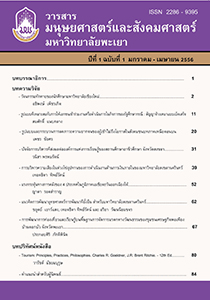วัจนกรรมทักทายของนักศึกษามหาวิทยาลัยเชียงใหม่
Keywords:
วัจนกรรมทักทาย, รูปแบบของถ้อยคำทักทาย, Speech act of greetings, Forms of speechAbstract
การศึกษาเรื่อง “วัจนกรรมทักทายของนักศึกษามหาวิทยาลัยเชียงใหม่” มีวัตถุประสงค์เพื่อ 1) ศึกษารูปแบบของถ้อยคำที่แสดงวัจนกรรมทักทายของนักศึกษามหาวิทยาลัยเชียงใหม่ 2) ศึกษาปัจจัยที่มีผลต่อการเลือกใช้ถ้อยคำในวัจนกรรมทักทายของนักศึกษามหาวิทยาลัยเชียงใหม่ โดยศึกษาตามแนวคิดเรื่องวัจนกรรมของ จอห์น อาร์ เซิร์ล (John R. Searle) และอธิบายปัจจัยต่าง ๆ ที่มีผลต่อการเลือกใช้วัจนกรรมทักทายตามแนวคิดเรื่องภาษากับปัจจัยทางสังคมของ อมรา ประสิทธิ์รัฐสินธุ์
ข้อมูลที่ใช้ในการวิจัยได้จากการบันทึกเสียงโดยมิให้ผู้สนทนารู้ตัวจากกลุ่มตัวอย่างนักศึกษามหาวิทยาลัยเชียงใหม่จำนวน 160 คน ซึ่งหลังจากบันทึกเสียงแล้ว ผู้วิจัยได้ทำการสัมภาษณ์นักศึกษากลุ่มตัวอย่างเพิ่มเติม เพื่อให้ได้ข้อมูลที่ตรงกับความเป็นจริงมากที่สุด
ผลการศึกษาพบรูปแบบของถ้อยคำที่แสดงวัจนกรรมทักทายจำนวน 3 รูปแบบคือ ทักทายด้วยภาษาสุภาพแบบเป็นทางการ ทักทายด้วยภาษาสุภาพแบบเป็นกันเอง และทักทายด้วยภาษาไม่สุภาพแบบเป็นกันเอง โดยการเลือกใช้รูปแบบของถ้อยคำเพื่อแสดงวัจนกรรมเหล่านี้จะแตกต่างกันออกไปตามปัจจัย 2 ปัจจัย คือปัจจัยด้านสถานการณ์ (เป็นทางการ/ไม่เป็นทางการ) และปัจจัยด้านบุคคล 4 ปัจจัย คือ ความสนิทสนม สถานภาพของคู่สื่อสาร เพศ และชาติพันธุ์ของคู่สื่อสาร
Chiang Mai University Students’ Speech Act of Greetings
Atiphong Peatchkerd
School of Liberal Arts, University of Phayao
The research of students’ Greetings Speech Act in Chiang Mai University aims 1) to study forms of speech relating to speech act of CMU students’ greeting, 2) to investigate factors influencing students’ speech choosing. Two concepts have been applied to the research as follows: John R. Searle’s and Amara Prasithrathsint’s speech act theory.
The data of this research gathered from 160 students in Chiang Mai University by recording while they were making a conversation without telling them. After doing the record, the sample groups were interviewed again in order to gain the information as correct as possible.
The findings show that there are 3 forms of speech act chosen by the sample groups; 1) a formal polite speech act 2) an informal polite speech act, 3) an informal impolite speech act. The way to choose Greeting speech act of the sample groups is varied by 2 factors; one is communicative factor based on formal and informal situation; the other is social factors such as familiarity, social relation, gender and ethnicity of interlocutors.
Downloads
How to Cite
Issue
Section
License
ผู้นิพนธ์ต้องรับผิดชอบข้อความในบทนิพนธ์ของตน มหาวิทยาลัยพะเยาไม่จำเป็นต้องเห็นด้วยกับบทความที่ตีพิมพ์เสมอไป ผู้สนใจสามารถคัดลอก และนำไปใช้ได้ แต่จะต้องขออนุมัติเจ้าของ และได้รับการอนุมัติเป็นลายลักษณ์อักษรก่อน พร้อมกับมีการอ้างอิงและกล่าวคำขอบคุณให้ถูกต้องด้วย
The authors are themselves responsible for their contents. Signed articles may not always reflect the opinion of University of Phayao. The articles can be reproduced and reprinted, provided that permission is given by the authors and acknowledgement must be given.








